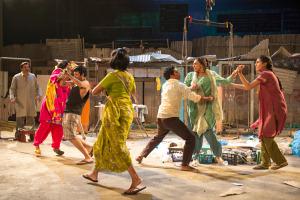Behind the Beautiful Forevers Review 2014
Forbidden Broadway used to have a great line about Les Miserables and its merchandising opportunities: ""Rich folks pay fifty bucks a shirt / that has a starving pauper on it. I couldn't help thinking of this line as I watched the National's expensively-produced new show about people living in slum conditions on the edges of Mumbai Airport: it has cost a lot of money to show this.
But then there lots of paradoxes to India itself, where the desperately poor literally scratch and scrape a living out of junk. "Rich people don't know what they've got, and they don't know what they throw away," says one of the scavengers early on.
But a play about recycling feels itself more recycled than original. Playwright David Hare, in what is astonishingly his 16th play for the National, has based it on Katherine Boo's award winning non-fiction reportage of three years she spent in the slums of Annawadi.
Hare achieves a narrative of sorts by putting the focus on the plight of one family in particular, falsely accused by their neighbours of inciting a suicide. A chastening, chilling account of the bureaucratic and legal nightmare they become embroiled in, where bribes are the main currency out of it, follows.
Director Rufus Norris blends it into an atmospheric, sprawling work, with a massive cast of 34 animating it with a lot of colour. But there's also a lot of cliché, too, as characters are delivered in broad brushstrokes.
It made me wish I had read the book instead. Perhaps it will have served a good purpose if it drives me to the page, but onstage it feels like a lot of effort for not enough reward.
"While consistently enjoyable, the show resists the temptation to make the spectacle of poor people in desperate competition look exotic; the design is knowingly economical and the most eye-catching moment comes when a torrent of empty water-bottles cascades down."
Dominic Cavendish for The Telegraph
"David Hare's excellent stage version honours and reinforces the book's refusal to trade in slum-poverty tourism. The speed and economy with which the play gives us a sharp sense both of widespread societal corruption and of the felt individuality of the people forced to negotiate it are remarkable."
Paul Taylor for The Independent
"Without in any way sentimentalising slum life, the play leaves one deeply affected by its stress on the possibility of goodness in a world of desperate deprivation."
Michael Billington for The Guardian
"But while the adaptation preserves the intimacy and humanity of Boo's book, it doesn't manage the same sense of fearless attentiveness to life's fragility. Hare is eloquent about the resilience of the characters, and there are some stirring monologues. Yet the play seldom achieves a really piercing vividness."
Henry Hitchings for the Evening Standard
External links to full reviews from popular press
The Telegraph - The Independent - The Guardian
Originally published on
